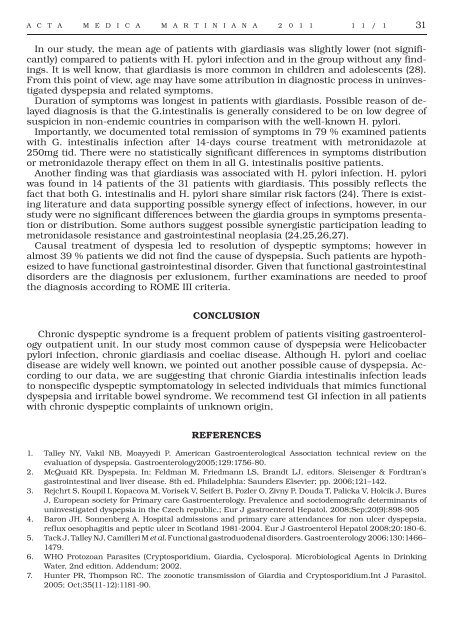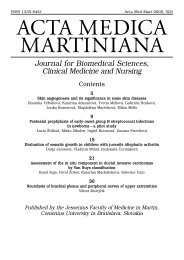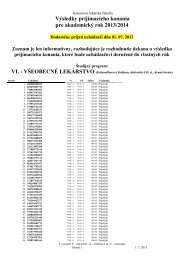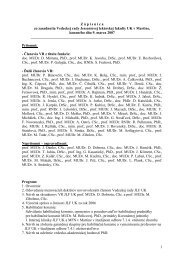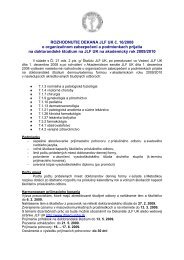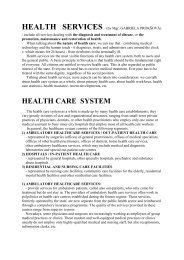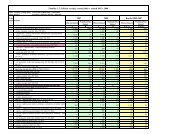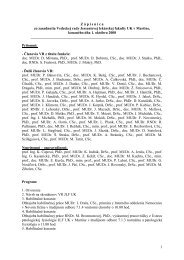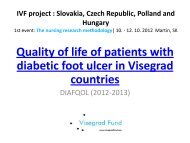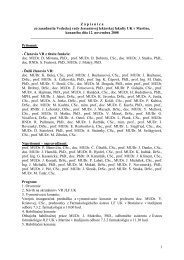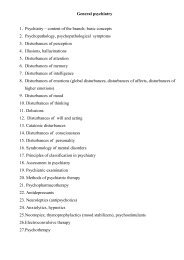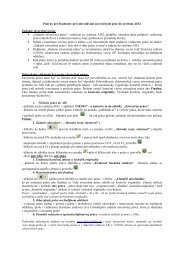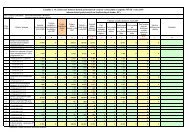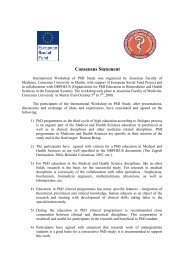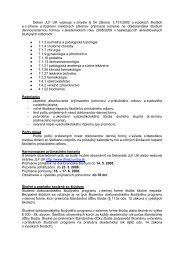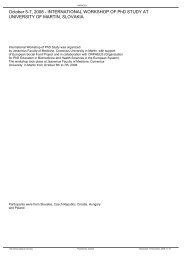Acta Medica Martiniana - Univerzita Komenského
Acta Medica Martiniana - Univerzita Komenského
Acta Medica Martiniana - Univerzita Komenského
Create successful ePaper yourself
Turn your PDF publications into a flip-book with our unique Google optimized e-Paper software.
A C T A M E D I C A M A R T I N I A N A 2 0 1 1 1 1 / 1 31<br />
In our study, the mean age of patients with giardiasis was slightly lower (not significantly)<br />
compared to patients with H. pylori infection and in the group without any findings.<br />
It is well know, that giardiasis is more common in children and adolescents (28).<br />
From this point of view, age may have some attribution in diagnostic process in uninvestigated<br />
dyspepsia and related symptoms.<br />
Duration of symptoms was longest in patients with giardiasis. Possible reason of delayed<br />
diagnosis is that the G.intestinalis is generally considered to be on low degree of<br />
suspicion in non-endemic countries in comparison with the well-known H. pylori.<br />
Importantly, we documented total remission of symptoms in 79 % examined patients<br />
with G. intestinalis infection after 14-days course treatment with metronidazole at<br />
250mg tid. There were no statistically significant differences in symptoms distribution<br />
or metronidazole therapy effect on them in all G. intestinalis positive patients.<br />
Another finding was that giardiasis was associated with H. pylori infection. H. pylori<br />
was found in 14 patients of the 31 patients with giardiasis. This possibly reflects the<br />
fact that both G. intestinalis and H. pylori share similar risk factors (24). There is existing<br />
literature and data supporting possible synergy effect of infections, however, in our<br />
study were no significant differences between the giardia groups in symptoms presentation<br />
or distribution. Some authors suggest possible synergistic participation leading to<br />
metronidasole resistance and gastrointestinal neoplasia (24,25,26,27).<br />
Causal treatment of dyspesia led to resolution of dyspeptic symptoms; however in<br />
almost 39 % patients we did not find the cause of dyspepsia. Such patients are hypothesized<br />
to have functional gastrointestinal disorder. Given that functional gastrointestinal<br />
disorders are the diagnosis per exlusionem, further examinations are needed to proof<br />
the diagnosis according to ROME III criteria.<br />
COnCLUSIOn<br />
Chronic dyspeptic syndrome is a frequent problem of patients visiting gastroenterology<br />
outpatient unit. In our study most common cause of dyspepsia were Helicobacter<br />
pylori infection, chronic giardiasis and coeliac disease. Although H. pylori and coeliac<br />
disease are widely well known, we pointed out another possible cause of dyspepsia. According<br />
to our data, we are suggesting that chronic Giardia intestinalis infection leads<br />
to nonspecific dyspeptic symptomatology in selected individuals that mimics functional<br />
dyspepsia and irritable bowel syndrome. We recommend test GI infection in all patients<br />
with chronic dyspeptic complaints of unknown origin,<br />
REFEREnCES<br />
1. Talley NY, Vakil NB, Moayyedi P. American Gastroenterological Association technical review on the<br />
evaluation of dyspepsia. Gastroenterology2005;129:1756-80.<br />
2. McQuaid KR. Dyspepsia. In: Feldman M, Friedmann LS, Brandt LJ, editors. Sleisenger & Fordtran’s<br />
gastrointestinal and liver disease. 8th ed. Philadelphia: Saunders Elsevier; pp. 2006;121–142.<br />
3. Rejchrt S, Koupil I, Kopacova M, Vorisek V, Seifert B, Pozler O, Zivny P, Douda T, Palicka V, Holcik J, Bures<br />
J, European society for Primary care Gastroenterology. Prevalence and sociodemografic determinants of<br />
uninvestigated dyspepsia in the Czech republic.; Eur J gastroenterol Hepatol. 2008;Sep;20(9):898-905<br />
4. Baron JH, Sonnenberg A. Hospital admissions and primary care attendances for non ulcer dyspepsia,<br />
reflux oesophagitis and peptic ulcer in Scotland 1981-2004. Eur J Gastroenterol Hepatol 2008;20:180-6.<br />
5. Tack J, Talley NJ, Camilleri M et al. Functional gastroduodenal disorders. Gastroenterology 2006;130:1466–<br />
1479.<br />
6. WHO Protozoan Parasites (Cryptosporidium, Giardia, Cyclospora). Microbiological Agents in Drinking<br />
Water, 2nd edition. Addendum; 2002.<br />
7. Hunter PR, Thompson RC. The zoonotic transmission of Giardia and Cryptosporidium.Int J Parasitol.<br />
2005; Oct;35(11-12):1181-90.


